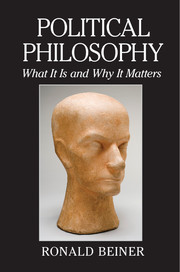Book contents
- Frontmatter
- Dedication
- Contents
- First Prologue: Horizons of Political Reflection
- Second Prologue: Freud, Weber, and Political Philosophy
- 1 Hannah Arendt: The Performativity of Politics
- 2 Michael Oakeshott: Life’s Adventure
- 3 Leo Strauss: The Politics of Philosophy
- 4 Karl Löwith: In Awe of the Cosmos
- 5 Excursus on Nature and History in the Strauss-Löwith Correspondence
- 6 Eric Voegelin: Modernity’s Vortex
- 7 Simone Weil: The Politics of the Soul
- 8 Hans-Georg Gadamer: Philosophy without Hubris
- 9 Jürgen Habermas: Politics as Rational Discourse
- 10 Michel Foucault’s Carceral Society
- 11 Alasdair MacIntyre: Fragmentation and Wholeness
- 12 Short Excursus on the Rise and Decline of Communitarianism as a Political Philosophy
- 13 John Rawls and the Death of Political Philosophy
- 14 Richard Rorty: Knocking Philosophy off Its Pedestal, or the Death of Political Philosophy Postmodernized
- Epilogue: On Not Throwing in the Towel
- Index
- References
5 - Excursus on Nature and History in the Strauss-Löwith Correspondence
Published online by Cambridge University Press: 05 August 2014
- Frontmatter
- Dedication
- Contents
- First Prologue: Horizons of Political Reflection
- Second Prologue: Freud, Weber, and Political Philosophy
- 1 Hannah Arendt: The Performativity of Politics
- 2 Michael Oakeshott: Life’s Adventure
- 3 Leo Strauss: The Politics of Philosophy
- 4 Karl Löwith: In Awe of the Cosmos
- 5 Excursus on Nature and History in the Strauss-Löwith Correspondence
- 6 Eric Voegelin: Modernity’s Vortex
- 7 Simone Weil: The Politics of the Soul
- 8 Hans-Georg Gadamer: Philosophy without Hubris
- 9 Jürgen Habermas: Politics as Rational Discourse
- 10 Michel Foucault’s Carceral Society
- 11 Alasdair MacIntyre: Fragmentation and Wholeness
- 12 Short Excursus on the Rise and Decline of Communitarianism as a Political Philosophy
- 13 John Rawls and the Death of Political Philosophy
- 14 Richard Rorty: Knocking Philosophy off Its Pedestal, or the Death of Political Philosophy Postmodernized
- Epilogue: On Not Throwing in the Towel
- Index
- References
Summary
As critics of Strauss and Straussianism have never ceased to emphasize, a view of political philosophy that puts esotericism at the heart of the whole enterprise poses unique hermeneutical challenges. Nods and winks are by definition harder to interpret than theoretical affirmations assumed to be sincere. How do these hermeneutical challenges affect the enterprise of interpreting Strauss himself? Can a theorist who sees esotericism as central to the nature and identity of philosophers be trusted not to engage in significant esoteric writing of his own? One sure way of surmounting this problem is to turn from Strauss’s public texts to his private texts, philosophical views confided to a good and trusted friend in a context where the imperatives of politic communication (as Strauss and Straussians understand this) are not applicable. In particular, we may be able to gain privileged access to Strauss’s most important ideas by eavesdropping on his epistolary exchanges with Karl Löwith on the all-important theme of nature versus history.
Consider Strauss’s remarkable letter to Löwith of August 15, 1946, containing the following astonishing statement of what Strauss believes with respect to what is fully natural:
I really believe ... that the perfect political order, as Plato and Aristotle have sketched it, is the perfect political order. Or do you believe in the world-state? If it is true that genuine unity is only possible through knowledge of the truth or through search for the truth, then there is a genuine unity of all men only on the basis of the popularized final teaching of philosophy (and naturally this does not exist) or if all men are philosophers (not PhDs, etc.) – which likewise is not the case. Therefore, there can only be closed societies, that is, states. But if that is so, then one can show from political considerations that the small city-state is in principle superior to the large state or to the territorial-feudal state. I know very well that today it cannot be restored.…
- Type
- Chapter
- Information
- Political PhilosophyWhat It Is and Why It Matters, pp. 80 - 90Publisher: Cambridge University PressPrint publication year: 2014
References
- 1
- Cited by



